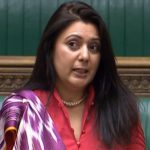Liz Truss is expected to make a decision on whether to uprate benefits in line with inflation in November, a department for work and pensions minister has said.
Victoria Prentis told Sky News that “no decision has been taken about the uprating of benefits” but that she is sure that the government will “make that decision as quickly as possible”.
It comes as a Downing Street source said that the prime minister can see both sides of the debate and remains “genuinely undecided” on the matter.
The source added that Ms Truss will be “listening to cabinet and colleagues” before a stance is taken.
Sunak ally welcomes ministerial appointment – Politics latest
Ms Prentis told Sky News that a late November decision would allow for the latest figures on earnings, due tomorrow, and the latest figures on inflation, due next week, to be considered by Work and Pensions Secretary Chloe Smith.
“She can’t do anything until those figures have come. And she will then consider how to, if at all, uprate benefits – and what figure to choose,” Ms Prentis continued.
Nadhim Zahawi warns Tories ‘dither or delay will end in defeat’ as he urges party to unite
Sophy Ridge on Sunday podcast: Nadhim Zahawi, Jonathan Ashworth, and Angus Robertson
Labour calls for investigation into Liz Truss’s chief of staff after he was questioned as witness in FBI bribery inquiry
“She has a very wide discretion to do that. We make a decision and we communicate usually by the end of November.
“And then I will take through a piece of legislation in the House of Commons, which happens every year in January – and then benefits will be uprated or not in accordance with whatever method is chosen in April.”
The Office for Budget Responsibility (OBR) has been commissioned by Chancellor Kwasi Kwarteng to produce an economic forecast on 23 November.
It is understood that the Department for Work and Pensions’ computer systems need to kick in two days after this on 25 November, making this the likely date on which a decision on whether to uprate benefits will be made – but this is not set in legislation.
The PM has in recent weeks refused to commit to raising benefits in line with inflation, despite growing pressure from a cabinet minister and senior Tory MPs to do so amid the cost of living crisis.
Speaking to broadcasters in Birmingham where the Conservative Party’s conference took place last week, the prime minister said she had “not made a decision” on whether to stick to the benefit uprate promised by her predecessor Boris Johnson.
“I’m very clear that going into this winter, we do need to help the most vulnerable,” Ms Truss added.
Please use Chrome browser for a more accessible video player
House of Commons Leader Penny Mordaunt became the first cabinet minister to openly oppose the idea of not uprating benefits with inflation last week, telling Times Radio: “I’ve always supported – whether it’s pensions, whether it’s our welfare system – keeping pace with inflation. It makes sense to do so. That’s what I voted for before.”
Last Monday, senior Conservative MP Damian Green told Sky News: “The government should uprate in line with inflation. The previous government said it was going to, so people are expecting this.”
Former transport secretary Grant Shapps has also stepped up the pressure. Asked if he would want to see benefits increased in line with inflation, he said: “Of course, every politician would want to see that.”
While former health secretary Sajid Javid also told BBC Radio 4’s Today programme on Monday: “I personally believe that benefits must stay in line with inflation.”
It is understood that Downing Street is considering increasing Universal Credit using a lower metric, such as the increase in average earnings, instead of inflation.
Benefits are usually uprated in line with the consumer price index (CPI) rate of inflation from September, with the rise coming into effect the following April.
Please use Chrome browser for a more accessible video player
The Institute for Fiscal Studies estimates that each percentage point rise in CPI adds £1.6 billion to welfare spending.
Philippa Stroud, who worked under former work and pensions secretary Sir Iain Duncan Smith on welfare and is now at the Legatum Institute, has warned failure to raise benefits in line with inflation would push 450,000 people into poverty next year.
While Ms Truss has not ruled out a real-terms cuts to benefits, she has said she is “fully committed” to raising pensions in line with inflation.
The row over benefits comes after the government dramatically dropped its plans to abolish the 45% tax rate on earnings over £150,000 following widespread criticism, including from Tory MPs, earlier this month.
Ms Truss defended the U-turn last week, saying the government “listens” and the tax cut “wasn’t a core part” of the growth plan.






















